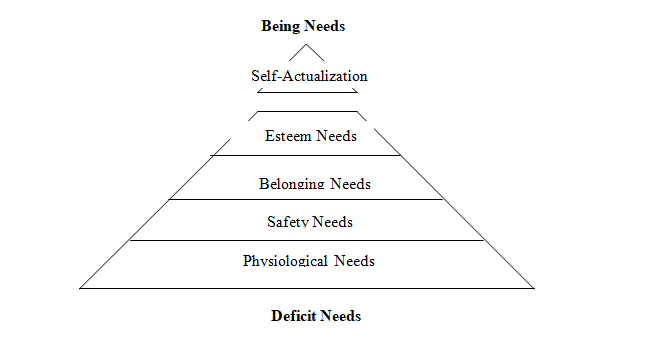Historical Person with most Significant impact on Modern Psychology
Despite the fact that psychology has a short history, its study has had major impact on the modern psychology. In my own opinion, Abraham Maslow is a great figure in the history of psychology that has had a strong influence on modern psychology.
He developed the famous hierarchy of needs in which he introduced five more layers of needs above the standard; air, water, food and sex (Boeree, 2006). In his arguments, he asserted that some needs were more important than others depending on the conditions.
For instance, if one was hungry and thirsty, he or she tends to quench the thirst first then goes ahead to eat (Boeree, 2006). However, if the same person is exposed to a situation that will undermine his/her breathing, he/she takes care of the breathing first. Figure 1.0 below shows the Maslow’s Needs Triangle (Boeree, 2006):

Figure 1: Maslow’s Needs Triangle/Pyramid
Source: Webspace.ship.edu (2006)
Maslow’s findings have had had a significant influence on modern psychology, education and healthcare. Since the 1970s humanistic psychology has influenced education in many ways such as in encouragement of creativity and learning communities. In addition to that, it is important to note that the theory blends well with other theories of psychology. “For instance, several therapists adopt humanistic undertones when working with their clients” (Abraham Maslow, 2009). As such, the individual appreciates the benefit that will result from advocating for adherence to core values and beliefs in shaping peoples’ lives for good. “Rational-emotive therapy, reality therapy, and encounter therapy are examples of psychotherapies linked to humanistic psychology” (Life Tips, 2011). Also, the theory has significant influence in many fields of education such as in business where Maslow’s Hierarchy is taught. Overall, the humanistic psychology has key influence in many aspects of modern psychology and education because it promotes positivity and goodness of humanity (Abraham Maslow, 2009).
School of Psychological Thought most Consistent with personal Beliefs
Humanistic Psychology (Humanism) is a School of Thought that I find the most consistent with my personal beliefs. This branch of psychology was developed by Abraham Maslow as a reaction to behaviourism and psychoanalysis.
“As opposed to the latter branches of psychology, humanistic psychology focussed on individual’s free will, personal growth and self-actualization” (Kendra, 2011). As such, the theory appreciates the role of personal choice in the development of human behaviour.
According to the theory, each individual is considered to have the potential to trigger growth and self-actualization. From my own perspective, a person’s willingness, ability and determination in taking the necessary actions is a key to self-actualization. The lack of willingness to improve causes a person’s inner morale to die, consequently, there will be no action taken for any development. Some of the key focuses of humanistic psychology are described below:
- The Role of the Individual: Humanistic psychology holds that individuals have a very critical role in defining their state of mental health. As such, taking responsibilities for one’s actions will result in being mentally healthy.
- Environmental Influence: Apart from focusing solely of the individuals inner abilities, the theory accepts the fact that the environment can trigger some changes in the individual’s thinking (Abraham Maslow, 2009).
- Significance of the Present: The theory holds that the present is more important to someone’s life than the past or the future.
- Personal Growth and Understanding: “The ultimate goal for each person is to be truly happy, and this can only be realized through improvement and understanding oneself” (Abraham Maslow, 2009).
In line with the theory, life is something that should be meaningful and full with hope for everyone, despite all challenges that come that with it. I totally agree with the fact that taking personal responsibilities for one’s actions regardless of the negativity or positivity will result in peace within an individual.
As a result, one will be comfortable with respect to the state of mental health. In conclusion, an individual should engage fully in his or her potential and outdo any undermining factors in order to fully accomplish his or her major dream in life.
Reference List
Abraham Maslow. (2009). Humanistic Psychology. Web.
Boeree, G. (2006). Personality Theories. Web.
Kendra, C. (2011). Major Schools of Thought in Psychology. Web.
Life Tips. (2011). Humanistic Psychology Tips. Web.